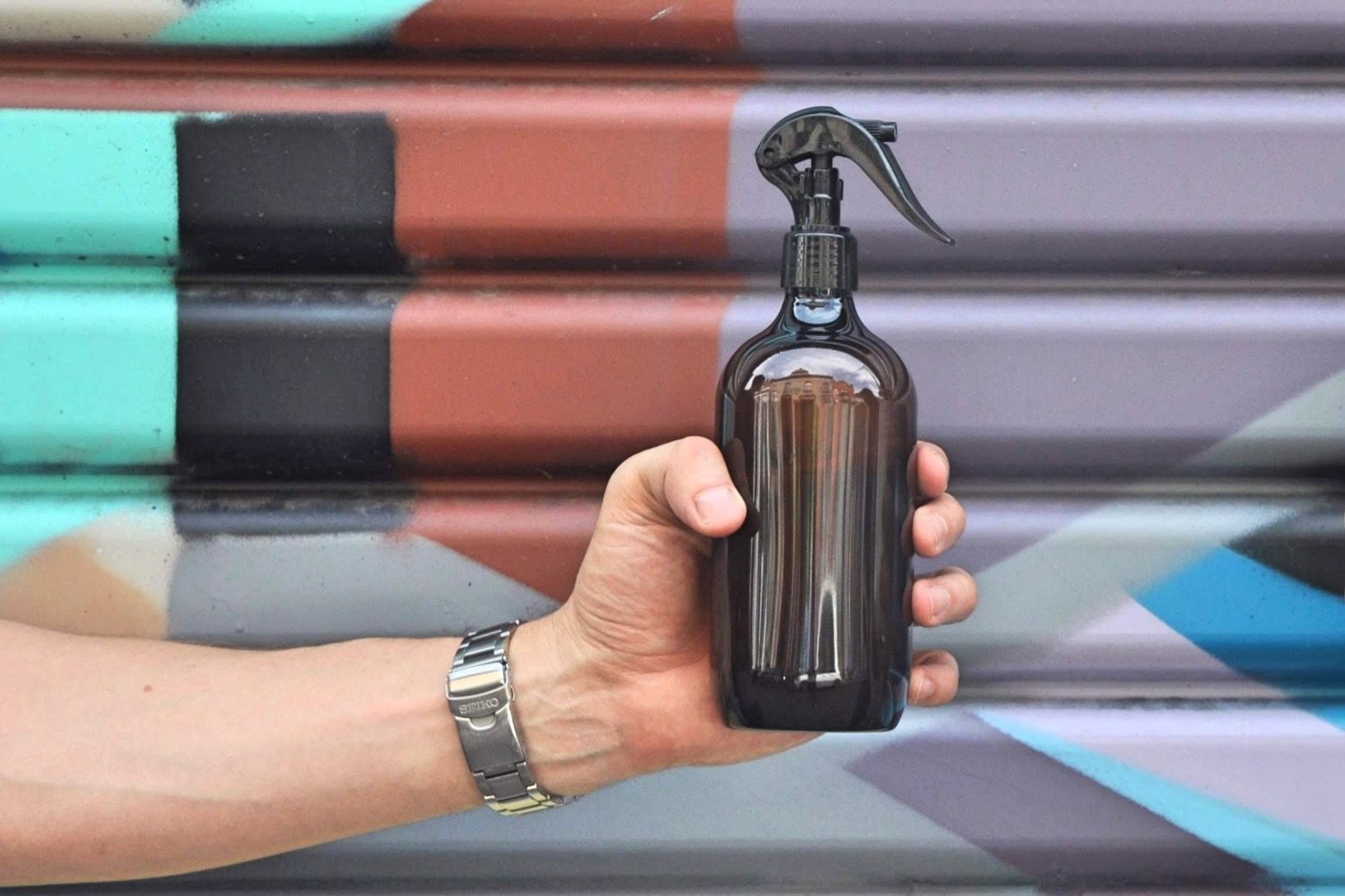Cleaning With White Vinegar: 11 Recipes For 11 Uses
Keen to DIY your cleaning supplies to keep your sprays simple and waste free? Use these white vinegar cleaner recipes! Vinegar forms the base for many homemade cleaners. Find out how to use it to clean your home…
JUMP TO:
The surfaces you can clean with white vinegar include kitchen benches, stove tops, basins and any stainless steel surfaces.
Don’t use it on natural stone, such as granite and marble, as its acid content can scratch it. The acids in vinegar can also damage wood surfaces. It can also stain delicate fabrics if it is too concentrated.
Other than an all-purpose cleaner, you can also use it to clean your toilet (it will not disinfect it though), windows/mirrors, fridge, dishwasher and washing machine, as well as as a fabric softener and stain remover.
You can use citrus peels or essential oils to give it a scent and to get rid of the vinegar smell a bit, but this smell usually goes on its own not long after you use it as there is no smell once it is dry.
We prefer the use of citrus peels to that of essential oils as essential oils can be endocrine disrupting and are not well studied enough to be considered safe for all uses. They need to be used essential wisely and their safety precautions need to be heeded! Waste-Free PhD has a great article on the safety of essential oils here.
How does vinegar clean?
Vinegar is highly acidic (it has a pH of 2.0), making it an inhospitable environment for many microorganisms. It kills these bacteria and viruses by destroying their cell structures. It is hypothesised that they cross the cell membrane of bacteria and a release in protons causes the cells to die.
Does vinegar (acetic acid) actually clean?
A few studies have been conducted on its effectiveness as a cleaning agent. These studies have found that it can kill bacteria and viruses, but it was not shown to kill S. aureus, a relatively common type of bacteria that usually doesn't cause any harm, but, can cause infection if it enters the body and multiplies.
It can be used as a general cleaner, but not as a disinfectant.
The study, Acetic Acid, the Active Component of Vinegar, Is an Effective Tuberculocidal Disinfectant - found that “the high-level capacity of acetic acid in killing mycobacteria, regarded as the most disinfectant-resistant bacteria due to the structure of their lipid-rich cell walls, suggests that perhaps it should be revived as a broadly effective bactericide that can be used as a general sanitizer”.
And, the study, Effectiveness of Common Household Cleaning Agents in Reducing the Viability of Human Influenza A/H1N1 found that “dilute solutions of washing up detergent, bleach or vinegar provide suitable means of disinfecting surfaces of influenza A virus” and that “it is possible to use common, low-technology agents such as 1% bleach, 10% malt vinegar, or 0.01% washing-up liquid to rapidly and completely inactivate influenza virus”.
In one study titled Efficacy of sodium hypochlorite bleach and 'alternative' products in preventing transfer of bacteria to and from inanimate surfaces, vinegar “showed antimicrobial activity against the Gram negative organisms S. typhi and E. coli”, but it was not found to be effective against the Gram positive bacteria, S. aureus.
It was also found that vinegar wash significantly reduces the numbers of viruses (by about 95% in fact!) in a study called Reduction of Poliovirus 1, Bacteriophages, Salmonella Montevideo, and Escherichia coli O157:H7 on Strawberries by Physical and Disinfectant Washes.
The National Collaborating Centre for Environmental Health’s Effectiveness of Alternative Antimicrobial Agents for Disinfection of Hard Surfaces concludes that “it is unlikely that vinegar, lemon juice or baking soda, by themselves, will become mainstream antimicrobial agents in commercial settings, but the notable efficacy of vinegar and lemon juice may have indications for their potential use as household antimicrobial agents or in formulations of disinfectants”.
Therefore, it can be said to be an effective regular surface cleaner, but it is not a disinfectant and will not disinfect anything in the way that things like bleach do.
What is the difference between white vinegar and cleaning vinegar?
Different vinegars have different acidities and this can affect their cleaning ability. While regular white vinegar has an acidity of 5%, cleaning vinegar has an acidity of 6%, making it a stronger cleaner (20% stronger in fact!), however it cannot be used in cooking like white vinegar.
Can apple cider vinegar be used instead of white vinegar?
Apple cider vinegar is less acidic than white vinegar, so it is a milder cleaner, which can be useful for some types of cleaning when a less potent cleaner is wanted.
CLEANING WITH VINEGAR: RECIPES
All purpose cleaner for everyday cleaning
Use a solution that is 50% white vinegar and 50% water.
You can add essential oils, such as eucalyptus oil, tea tree oil, for a scent (note our warning on essential oils in the opening paragraphs).
You can also give it a scent using citrus peels. To do this, fill a jar with citrus peels, cover in white vinegar, and leave in a dark cupboard for 2 weeks. After 2 weeks, strain this to get citrus vinegar to use as the 50% vinegar in the all purpose cleaner.
Do not use citrus vinegar cleaner on wood, marble or granite.
Cleaning fruit and vegetables with a vinegar rinse
Use a solution that is 25% vinegar and 75% water.
Put this solution in a spray bottle, spray fruit/vegetables with the solution and then rinse with water.
Cleaning stainless steel surfaces
Use 100% white vinegar.
Pour vinegar on a cloth and scrub. Follow the grain when scrubbing and then dry with a soft, clean cloth.
Cleaning glass and windows
Use a solution that is 50% white vinegar and 50% water.
Use a spray bottle to spray it on and then wipe with newspaper or a cloth. Dry with another clean cloth afterwards.
Cleaning your toilet
Use 100% white vinegar.
Pour 1-2 cups into the toilet bowl. Leave it to sit overnight; then scrub and flush.
You can do the same with half a cup of bicarb afterwards (but do not mix the two! See below…).
This can be used to clean your toilet - but will not disinfect it like bleach would. Use diluted bleach if you want to disinfect your toilet.
Using as a stain remover
Use 100% white vinegar.
Soak the stain; then launder as usual. Don’t dry the garment until the stain is fully removed.
Using as a fabric softener
Use 100% white vinegar.
Place half a cup in the fabric softener compartment of the washing machine before starting a cycle.
Cleaning your fridge
Use a solution that is 50% white vinegar and 50% water.
Use a spray bottle to spray the inside of your fridge. Wipe it with a cloth.
Cleaning your dishwasher
Use 100% white vinegar.
Place a container full of 1 cup of vinegar in the top rack of your dishwasher. Don’t put any detergent in the dishwasher. Run it without drying.
Cleaning your washing machine
Use 100% white vinegar.
Run 2 cups through a wash cycle with hot water.
Descaling a kettle
Use 100% white vinegar.
Boil white vinegar in the kettle.
OTHER OPTIONS: OTHER DIY ALL-PURPOSE CLEANERS
A mixture of Castile soap and water
A mixture of dishwashing liquid and water
Bicarbonate of soda or baking soda is an abrasive cleaner. Its alkalinity and mild abrasiveness provide it with cleaning abilities.
DO NOT MIX VINEGAR & BAKING SODA
While vinegar and baking soda are both effective cleaners separately, if you mix them, they become ineffective.
Blending vinegar, which is an acetic acid, with baking soda, which is a base, essentially produces a neutral i.e. something that is neither acidic or basic. It breaks the solution down into a solution that is basically water with a little bit of sodium acetate, i.e. salt.
DO NOT MIX VINEGAR & BLEACH
Mixing a chlorine-based disinfectants like bleach with vinegar and/or lemon juice can create chlorine gas, which is toxic.
WHERE CAN I BUY VINEGAR IN BULK?
There are a number of bulk stores and co-ops that sell white vinegar and/or cleaning vinegar in bulk in Melbourne, Australia. These include:
Ceres, Brunswick
Friends of the Earth, Fitzroy
The Source, Hampton
Nature’s Harvest, Hurstbridge
Unwrapped Pantry, Belgrave South
The Full Pantry, Croydon
Check your local bulk store to see if they sell it in bulk and take your own container to fill up with it.
Or buy it in bulk yourself! You can buy vinegar in large big bottles of many litres from most wholesalers. In Melbourne, you can find it at Costco and NSM Wholesalers or buy it online here (UK) or here.
Have you used vinegar in any other ways around the house?
*we maintain this site in our free time and support in any way, shape or form means a lot and helps us keep it running, whether it is using an affiliate link when investing in something, sharing our content, or buying us a coffee on Ko-fi.



